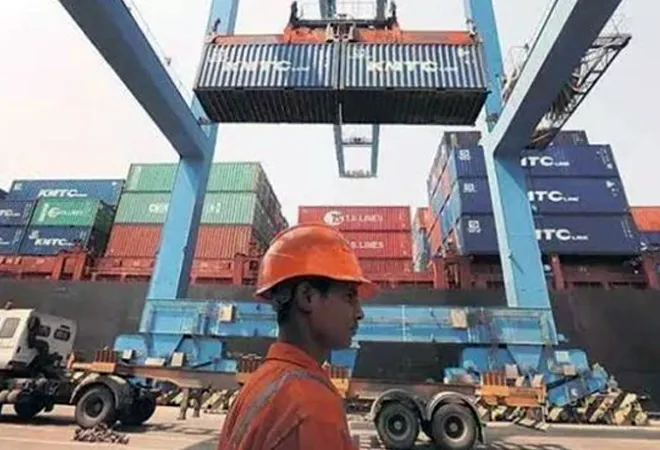-
CENTRES
Progammes & Centres
Location
India’s desire to reconfigure the global balance of power is predicated on its ability to become an indispensable element in the global economic order. Thus, it is not surprising that the new foreign trade policy seems to shed the reticence of the past.

China’s aggression around its periphery and Russian invasion of Ukraine has shrunk the space for the developing world to pursue their developmental agenda.Geopolitically, major world powers are divided and the fault-lines between them are widening by the day. Great power polarization is the new reality that all states in the international system today have to respond to. China’s aggression around its periphery and Russian invasion of Ukraine has shrunk the space for the developing world to pursue their developmental agenda. And in the geoeconomic realm, the post Cold War consensus on the fundamentals of the global economic order is fast unravelling. Trade and technology cooperation to build political trust is giving way to trust based trade and technology partnerships. Those very nations that led the debate on the economic globalization are turning away from it in unprecedented ways. Even as challenges mount for the global order on several fronts, it is being viewed as India’s moment and Indian policy makers are trying to ensure that India does not miss the bus this time in carving a unique place for itself in the global political and economic order. For India, keeping the focus on domestic consolidation is key to its global rise. Ensuring that India emerges as a critical vector in the global trade matrix, therefore, should be a priority and that is reflected in the new trade policy as it seeks to further digitisation and streamlining of procedures for exporters, boost e-commerce exports, make adequate provisions for MSMEs, and enhance India’s ability to undertake rupee-trade with other nations. India’s exports reached a historic high of $ 750 billion this year from $ 500 billion in 2020–2021 though the country’s share of the international trade market is still relatively minuscule at $ 32 trillion. It is therefore essential that New Delhi keeps on working towards a dynamic foreign trade policy that manages to respond to India’s growing aspirations as well as the new geoeconomic landscape.
India’s economic transformation has put the nation at the centre of the emerging global order, plunging it willy-nilly into the realm of great power politics.It is India’s economic rise that has shaped the trajectory of Indian foreign policy over the last three decades. Indian policymakers have been forced to respond to their nation’s political and economic rise and reshape its foreign policy accordingly. India’s economic transformation has put the nation at the centre of the emerging global order, plunging it willy-nilly into the realm of great power politics. And today India seems poised to be at the threshold of achieving the status of a major global power, emerging as an indispensable element of the new global order — exemplified by its growing economic and military might. Indian democracy became so much more attractive after the Indian economy started delivering strong results. India’s economic is already changing global strategic equations and is having a profound impact on the emerging balance of power. If, today, India is capable of arguing that it wants to be a “leading player” in the global order — a rule maker not merely a rule taker — it is the result of the confidence that the Indian economic story is alive and well. India can play the role of a responsible global stakeholder today largely because its economic capabilities allow for that possibility. As the global order evolves into a more competitive phase with major powers openly competing, global institutions largely becoming dysfunctional and economic globalisation facing fragmentation, India stands at the centre of most of these debates. And the world listens to India because a democratic India trying to move towards an ambitious target of a US $5 trillion economy is a story well worth believing in and nurturing. Indian policymakers can be aspirational to this degree today only by unleashing the latent energies of a populace circumscribed by decades of regressive economic policies. India’s desire to configure the global balance of power is predicated on its ability to become an indispensable element in the global economic order. It is not surprising, therefore, that it is shedding the reticence of the past in its economic engagements with the world. That’s the message that comes out of the new foreign trade policy and hopefully it will provide enough ballast to India’s trading community to achieve the ambitious targets before time.
The views expressed above belong to the author(s). ORF research and analyses now available on Telegram! Click here to access our curated content — blogs, longforms and interviews.

Professor Harsh V. Pant is Vice President – Studies and Foreign Policy at Observer Research Foundation, New Delhi. He is a Professor of International Relations ...
Read More +